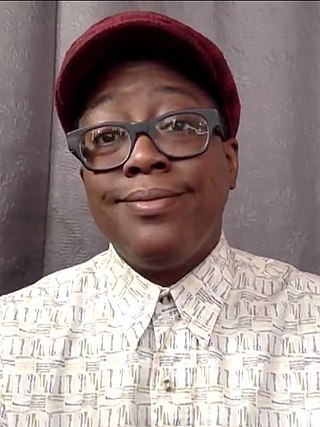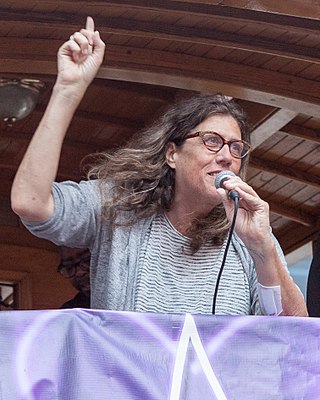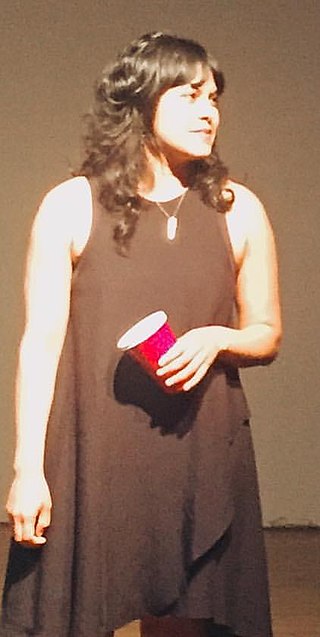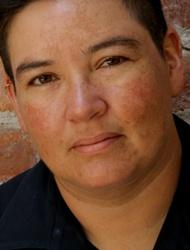Related Research Articles

Jonathan David Katz is an American activist, art historian, educator and writer. He is currently Associate Professor of Practice in Art History and Gender, Sexuality & Women's Studies at the University of Pennsylvania.

B. Ruby Rich is an American scholar; critic of independent, Latin American, documentary, feminist, and queer films; and a professor emerita of Film & Digital Media and Social Documentation at UC Santa Cruz. Among her many contributions, she is known for coining the term "New Queer Cinema". She is currently the editor of Film Quarterly, a scholarly film journal published by University of California Press.

Cheryl Dunye is a Liberian-American film director, producer, screenwriter, editor and actress. Dunye's work often concerns themes of race, sexuality, and gender, particularly issues relating to black lesbians. She is known as the first out black lesbian to ever direct a feature film with her 1996 film The Watermelon Woman. She runs the production company Jingletown Films based in Oakland, California.

The Frameline Film Festival began as a storefront event in 1976. The first film festival, named the Gay Film Festival of Super-8 Films, was held in 1977. The festival is organized by Frameline, a nonprofit media arts organization whose mission statement is "to change the world through the power of queer cinema". It is the oldest LGBTQ+ film festival in the world.

GLQ: A Journal of Lesbian and Gay Studies is a scholarly, peer-reviewed journal based published by Duke University Press. It was co-founded by David M. Halperin and Carolyn Dinshaw in the early 1990s. In its mission, the journal seeks "to offer queer perspectives on all issues touching on sex and sexuality." It covers religion, science studies, politics, law, and literary studies.

Richard Fung is a video artist, writer, public intellectual and theorist who currently lives and works in Toronto, Ontario. He was born in Port of Spain, Trinidad and is openly gay.

Shelter is a 2007 American romantic drama film produced by JD Disalvatore and directed and written by Jonah Markowitz. It stars Trevor Wright, Brad Rowe, and Tina Holmes. It was the winner of "Outstanding Film–Limited Release" at the 2009 GLAAD Media Awards, Best New Director and Favorite Narrative Feature at the Seattle Lesbian & Gay Film Festival, and the People's Choice Award for Best Feature at the Vancouver Queer Film Festival. Shelter represents the feature directorial debut of Markowitz.

The GLBT Historical Society maintains an extensive collection of archival materials, artifacts and graphic arts relating to the history of LGBT people in the United States, with a focus on the LGBT communities of San Francisco and Northern California.
Del LaGrace Volcano is an American artist, performer, and activist from California. A formally trained photographer, Volcano's work includes installation, performance and film and interrogates the performance of gender on several levels, especially the performance of masculinity and femininity.

Susan O'Neal Stryker is an American professor, historian, author, filmmaker, and theorist whose work focuses on gender and human sexuality. She is a professor of Gender and Women's Studies, former director of the Institute for LGBT Studies, and founder of the Transgender Studies Initiative at the University of Arizona, and is currently on leave while holding an appointment as Barbara Lee Distinguished Chair in Women's Leadership at Mills College. Stryker serves on the Advisory Council of METI and the Advisory Board of the Digital Transgender Archive. Stryker, who is a transgender woman, is the author of several books about LGBT history and culture. She is a leading scholar of transgender history.
Amber L. Hollibaugh was an American writer, filmmaker, activist and organizer concerned with working class, lesbian and feminist politics, especially around sexuality. She was a former Executive Director of Queers for Economic Justice and was Senior Activist Fellow Emerita at the Barnard Center for Research on Women. Hollibaugh proudly identified as a "lesbian sex radical, ex-hooker, incest survivor, gypsy child, poor-white-trash, high femme dyke."
This is a timeline of notable events in the history of non-heterosexual conforming people of Asian and Pacific Islander ancestry, who may identify as LGBTIQGNC, men who have sex with men, or related culturally-specific identities. This timeline includes events both in Asia and the Pacific Islands and in the global Asian and Pacific Islander diaspora, as the histories are very deeply linked. Please note: this is a very incomplete timeline, notably lacking LGBTQ-specific items from the 1800s to 1970s, and should not be used as a research resource until additional material is added.
Madeleine Lim is a filmmaker, producer, director, cinematographer and LGBTQ activist. She is the founding Executive Director of the Queer Women of Color Media Arts Project (QWOCMAP), and an adjunct professor of film studies at the University of San Francisco. Lim is also a co-founder of SAMBAL and the US Asian Lesbian Network in the San Francisco Bay Area.
Kara Keeling is an American humanities academic. As of 2016 she is Associate Professor at the University of Southern California in the Critical Studies of Cinematic Arts and in the Department of American Studies and Ethnicity.

Juana María Rodríguez is a Cuban-American professor of Ethnic Studies, Gender and Women's Studies, and Performance Studies at the University of California, Berkeley. Her scholarly writing in queer theory, critical race theory, and performance studies highlights the intersection of race, gender, sexuality and embodiment in constructing subjectivity.
Henry M. Tavera was an AIDS activist, artistic director, and archivist based in the Mission District of San Francisco, California; his 1979 move to the region put him at the forefront of the AIDS epidemic via his involvement in various HIV/AIDS service organizations as well as AIDS theatre. He also did work around Chicano Gay Activism and teaching/advising. Tavera died on February 27, 2000, at 56 years old from kidney cancer.
Jaime Cortez is a Chicano-American graphic novelist, visual artist, writer, teacher, and performer. Cortez is also known for his role as an LGBT rights activist, and HIV/AIDS prevention work.

Xandra Ibarra, who has sometimes worked under the alias of La Chica Boom, is a performance artist, activist, and educator. Ibarra works across video, sculpture and performance. She is based in Oakland, California.

Marcia Ochoa is a United States-based professor of Feminist Studies and Critical Race and Ethnic Studies at the University of California, Santa Cruz. They are the co-founder of El/La Para TransLatinas and is credited with popularizing the term "translatina."
Jiro Onuma was a first-generation (issei) Japanese American gay man who was incarcerated in the Topaz Concentration Camp in Topaz, Utah in 1942. Onuma was born in Kanegasaki, Iwate Prefecture in 1904 and moved to the United States in 1923. The collection of his photos and personal belongings held by the GLBT Historical Society in San Francisco is the only material in this archive that tells us about the life of a gay Japanese American man who lived in San Francisco before World War II and was interned in an incarceration camp during the war. Tina Takemoto, a fourth-generation Japanese American artist and a visual studies scholar at the California College of the Arts, created a film titled Looking for Jiro (2011) that was based on Onuma's archival materials and received the Best Experimental Film Jury Award at the Austin LGBT International Film Festival.
References
- ↑ "Tina Takemoto - biography". Tina Takemoto. Retrieved March 7, 2015.
- ↑ "Hyphen Magazine - Issue 25 - generation - online exclusive - Looking Jiro". Spring 2012. Retrieved March 7, 2015.
- ↑ "Tina Takemoto faculty page" . Retrieved March 7, 2015.
- ↑ Ahmed, Sara (2001). Thinking through the skin . New York: Routledge. pp. 104–105. ISBN 0415223563.
- ↑ Takemoto, Tina (2014). "LOOKING FOR JIRO ONUMA A Queer Meditation on the Incarceration of Japanese Americans during World War II" . GLQ: A Journal of Lesbian and Gay Studies. 20 (3): 241–275. doi:10.1215/10642684-2422665. S2CID 145132740 . Retrieved March 7, 2015.
- ↑ Latimer, Tirza True (January 27, 2012). "Life in the archives". Open Space. SFMOMA. Retrieved March 7, 2015.